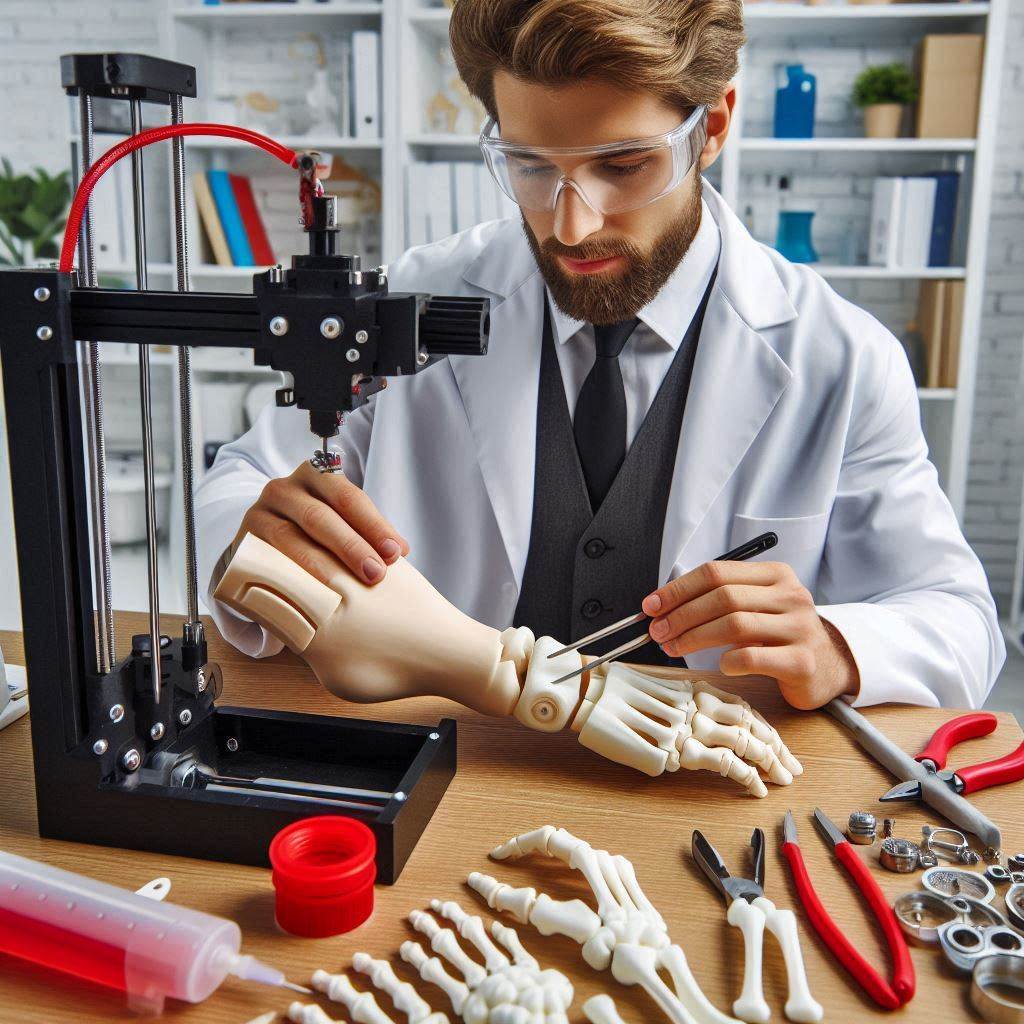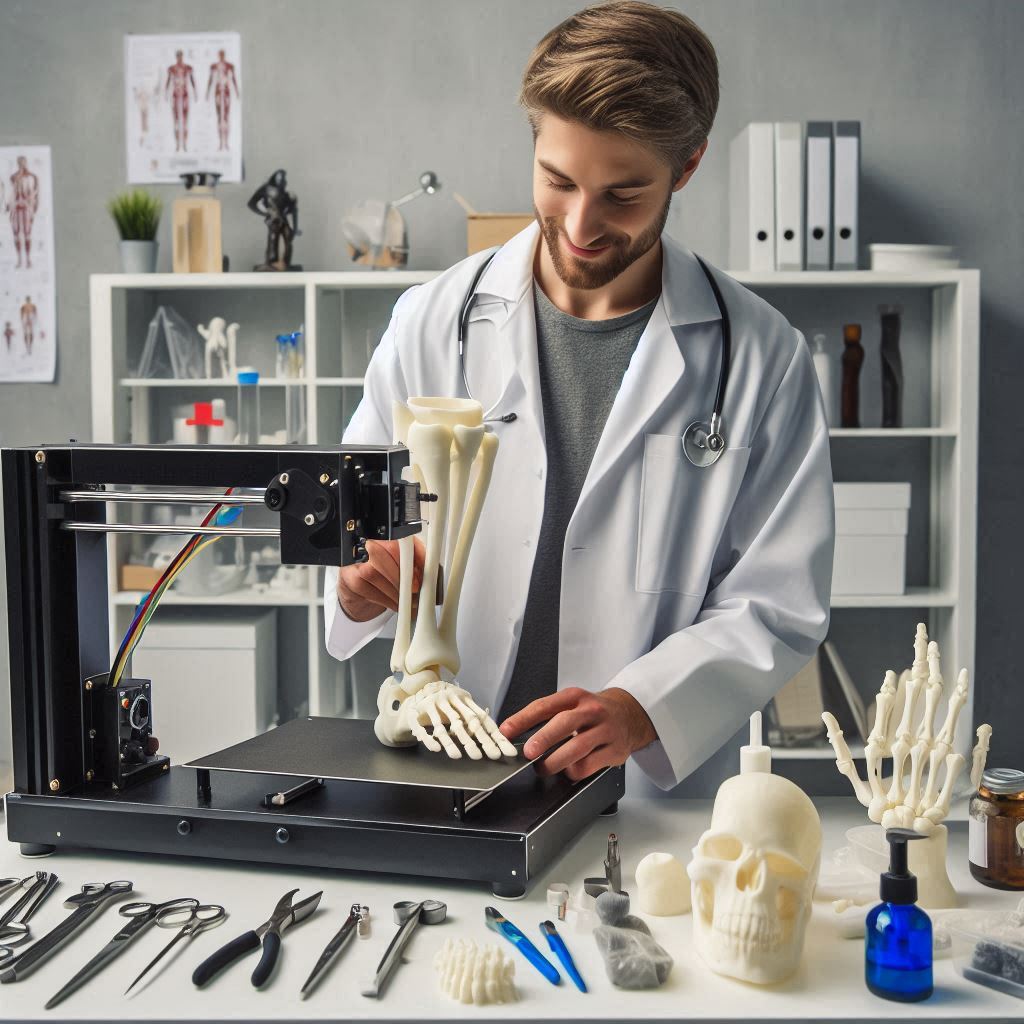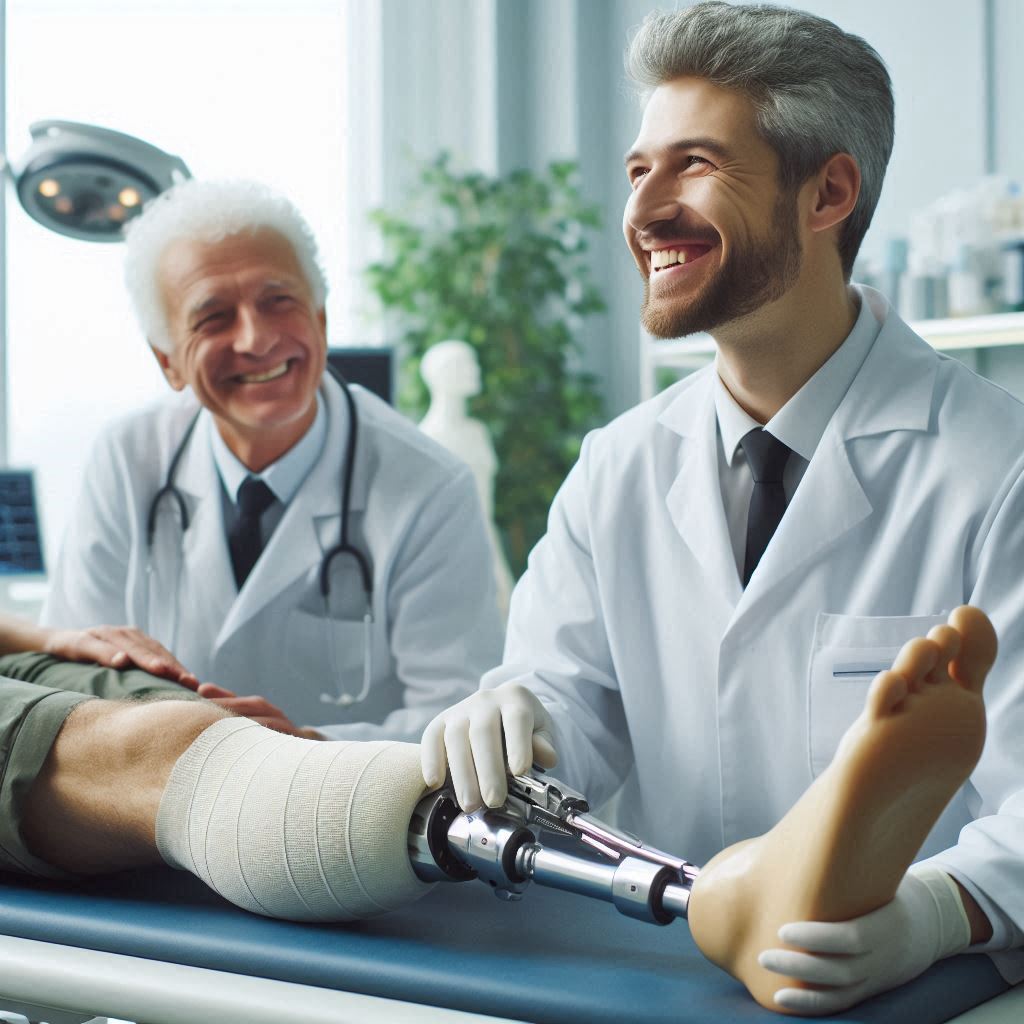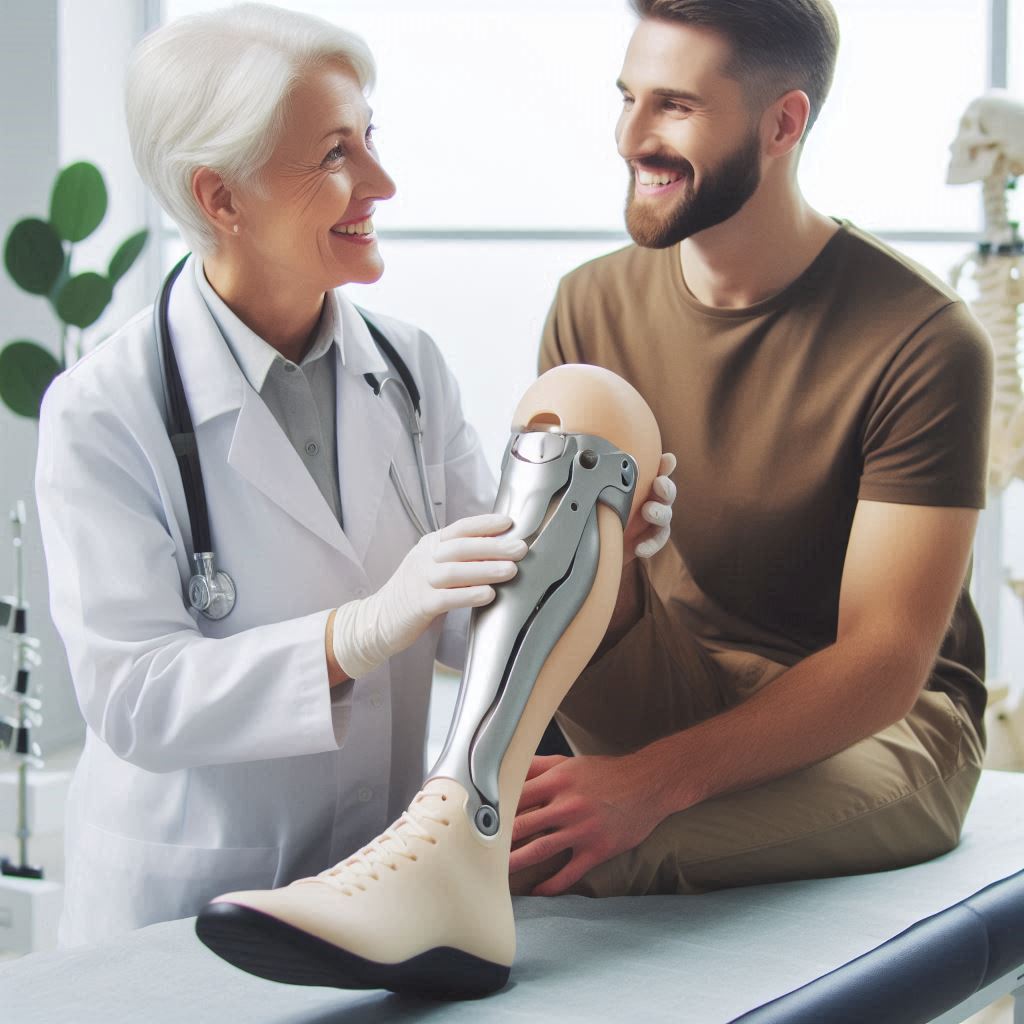Introduction
An orthopedic technologist is a specialized healthcare professional trained to assist orthopedic surgeons in various medical procedures.
Orthopedic technologists play a crucial role in healthcare by ensuring that surgical instruments are properly sterilized and organized.
They also help with patient care before, during, and after surgery, ensuring that the process goes smoothly.
Orthopedic technologists work closely with surgeons, nurses, and other healthcare professionals to provide the best patient care.
They are trained to operate complex orthopedic equipment and assist in casting and splinting for patients.
Their attention to detail and technical skills are vital in ensuring the success of orthopedic surgeries.
Orthopedic technologists also play a key role in educating patients on post-operative care and rehabilitation exercises.
In emergency situations, orthopedic technologists are trained to act swiftly and effectively to assist surgeons.
Overall, orthopedic technologists are essential members of the healthcare team, supporting orthopedic surgeons and improving patient outcomes.
Job Description of an Orthopedic Technologist
Responsibilities
Orthopedic technologists play crucial roles in healthcare settings, specializing in assisting orthopedic surgeons and healthcare teams.
Their responsibilities include preparing patients for procedures, sterilizing and maintaining surgical equipment, and ensuring a sterile environment during surgeries.
Responsibilities
Technologists are responsible for supporting orthopedic surgeons during surgeries, anticipating instrument needs, and ensuring patient safety and comfort throughout procedures.
They assist in casting, splinting, and applying braces, providing critical support in orthopedic treatments and recovery.
Skills Required
Successful orthopedic technologists possess strong technical skills in operating and maintaining orthopedic equipment and tools.
They must have excellent communication skills to interact effectively with patients, explaining procedures and providing pre- and post-operative care instructions.
Attention to detail is crucial in their role, ensuring accuracy in preparing surgical instruments and maintaining sterile fields.
Problem-solving skills enable them to handle unexpected situations during procedures, contributing to smooth surgical processes and patient outcomes.
Educational Background Needed
Becoming an orthopedic technologist typically requires completion of a formal education program, such as an associate degree or certification in orthopedic technology.
These programs provide comprehensive training in anatomy, physiology, orthopedic procedures, and sterile techniques.
Certification from recognized organizations may be required or preferred by employers, demonstrating competence and adherence to professional standards.
Continuing education and professional development are essential to stay updated with advancements in orthopedic technology and maintain certification.
Read: Benefits of a Career as an Ultrasound Technician
Role of orthopedic technologists in patient care
Orthopedic technologists play a crucial role in patient care by providing specialized support and assistance throughout various stages of treatment.
Let’s delve into the different ways in which orthopedic technologists contribute to the overall healthcare system:
Assisting in Surgeries
- Orthopedic technologists assist orthopedic surgeons during surgical procedures by setting up operating rooms, sterilizing equipment, and ensuring a smooth workflow.
- They are responsible for organizing surgical instruments, monitoring patients’ vital signs, and providing necessary assistance to ensure the success of the surgery.
- Orthopedic technologists work closely with the surgical team to maintain a sterile environment and uphold patient safety at all times.
Casting and Splinting
- Orthopedic technologists are trained to apply and remove casts, splints, and braces to support and immobilize injured or fractured limbs.
- They assist healthcare providers in assessing the extent of injuries, selecting appropriate orthopedic devices, and ensuring proper fit and function.
- Orthopedic technologists provide education to patients on cast care, mobility restrictions, and potential complications to promote optimal healing outcomes.
Providing Post-Operative Care
- Orthopedic technologists play a vital role in post-operative care by monitoring patients’ recovery, managing pain, and assisting with rehabilitation exercises.
- They collaborate with physical therapists, occupational therapists, and nurses to create personalized care plans for patients undergoing orthopedic procedures.
- Orthopedic technologists offer emotional support and guidance to patients and their families, helping them navigate the challenges of post-operative recovery.
In essence, orthopedic technologists serve as essential members of the healthcare team, contributing their specialized skills and knowledge to ensure the best possible outcomes for orthopedic patients.
Their role in assisting surgeries, casting and splinting, and providing post-operative care is invaluable in promoting patient wellness and recovery.
Read: The Role of Technology in Modern Sonography
Importance of Orthopedic Technologists in the Operating Room
Orthopedic technologists play vital roles in ensuring the smooth operation of orthopedic surgeries.
Their responsibilities encompass critical tasks that support surgical teams and enhance patient safety and outcomes.
Ensuring Proper Positioning of Patients
One of the key responsibilities of orthopedic technologists is to ensure the proper positioning of patients before and during surgeries.
This involves understanding the specific requirements of each procedure and adjusting patient positioning accordingly.
Proper positioning is crucial for both the success of the surgery and the comfort and safety of the patient.
Assisting Surgeons with Tools and Instruments
During surgeries, technologists assist orthopedic surgeons by providing them with the necessary tools and instruments.
They anticipate the surgeon’s needs, ensuring that instruments are sterile, organized, and readily available.
This proactive assistance helps maintain the flow of the procedure and minimizes interruptions, contributing to efficient surgical outcomes.
Transform Your Career Today
Unlock a personalized career strategy that drives real results. Get tailored advice and a roadmap designed just for you.
Start NowMaintaining a Sterile Environment
Maintaining a sterile environment in the operating room is paramount to preventing infections and ensuring patient safety.
Orthopedic technologists play a pivotal role in this by preparing and maintaining sterile fields, handling sterile instruments appropriately, and adhering strictly to aseptic techniques.
They collaborate closely with surgical teams to uphold rigorous standards of cleanliness and infection control throughout procedures.
In addition to their direct roles during surgeries, technologists contribute to patient care by monitoring vital signs, assisting with patient transfers, and providing comfort and reassurance to patients and their families.
Their presence in the operating room is integral to the overall efficiency and success of orthopedic surgeries.
Read: Understanding Ultrasound Technician Certifications

Collaborative role of orthopedic technologists in multidisciplinary teams
Orthopedic technologists play a vital role in multidisciplinary healthcare teams, working alongside surgeons, nurses, and other professionals to ensure the best possible outcomes for patients.
Their ability to communicate effectively and contribute to overall patient care is crucial in the orthopedic setting.
Working with surgeons, nurses, and other healthcare professionals
- Orthopedic technologists collaborate closely with surgeons during procedures, assisting with equipment setup, positioning patients, and providing surgical instruments as needed.
- They work hand-in-hand with nurses to ensure a smooth flow of patient care, including pre-op preparations, intraoperative support, and postoperative monitoring.
- Collaborating with other healthcare professionals, such as physical therapists and occupational therapists, allows orthopedic technologists to provide comprehensive care for patients throughout their treatment journey.
Communicating effectively with team members
- Clear and concise communication is essential for orthopedic technologists to relay important information to their team members before, during, and after surgical procedures.
- They must be able to follow instructions accurately and ask clarifying questions when needed to ensure that patient care is not compromised.
- Being able to communicate effectively with all members of the healthcare team helps to maintain a cohesive and efficient working environment, resulting in better patient outcomes.
Contributing to patient outcomes and overall care
- Orthopedic technologists play a critical role in patient outcomes by providing support to surgeons and other team members, which can help reduce the risk of complications during procedures.
- They also assist with patient education, ensuring that individuals understand their treatment plans and postoperative instructions to promote successful recovery.
- By contributing to the overall care of patients, orthopedic technologists help improve patient satisfaction, reduce hospital readmissions, and enhance the quality of healthcare delivery in orthopedic settings.
All in all, the collaborative role of orthopedic technologists in multidisciplinary teams is invaluable in ensuring the success of orthopedic procedures and the overall well-being of patients.
Through effective communication, teamwork, and a commitment to providing high-quality care, orthopedic technologists continue to make a positive impact in the field of healthcare.
Read: Continuing Education for Surgical Technologists: Why It Matters
Advancements in orthopedic technology and its impact on the role of technologists
Technological innovations continue to shape the landscape of orthopedic surgery, fundamentally altering the responsibilities and capabilities of orthopedic technologists.
Introduction of New Tools and Equipment
Recent years have seen significant strides in orthopedic technology, introducing state-of-the-art tools and equipment that revolutionize surgical practices.
These advancements range from robotic-assisted surgery systems to advanced imaging modalities and computer-assisted navigation tools.
Orthopedic technologists play a pivotal role in integrating these technologies into clinical practice.
They undergo rigorous training to master the operation and maintenance of these sophisticated tools, ensuring their efficient deployment during surgical procedures.
By embracing these innovations, technologists enhance surgical precision, reduce procedural times, and optimize patient outcomes through the use of cutting-edge equipment designed to improve accuracy and minimize patient recovery times.
Training and Adaptation to New Technologies
As technology continues to evolve, orthopedic technologists must stay abreast of the latest advancements.
Training programs are essential to familiarize technologists with new technologies, equipping them with the skills needed to support surgeons effectively.
This training encompasses learning the intricacies of robotic systems, mastering the use of advanced imaging techniques for preoperative planning, and understanding computer-assisted navigation for precise intraoperative guidance.
Technologists not only assist in the setup and operation of these technologies but also play a crucial role in troubleshooting and ensuring seamless integration into surgical workflows.
Their proficiency in adapting to new technologies enhances the overall efficiency of orthopedic procedures, contributing to better patient outcomes and satisfaction.
Improving Efficiency and Patient Outcomes
The adoption of advanced orthopedic technologies has brought about marked improvements in surgical efficiency and patient care.
Robotic-assisted systems enable surgeons to perform procedures with unparalleled precision, leading to reduced tissue trauma, minimal blood loss, and faster recovery times for patients.
Technologists support these advancements by optimizing the use of robotic arms, ensuring precise instrument positioning, and maintaining sterile fields throughout procedures.
Moreover, the integration of minimally invasive techniques facilitated by technological innovations allows for smaller incisions, decreased postoperative pain, and shortened hospital stays.
Technologists’ expertise in these areas enhances the overall quality of care, fostering a patient-centered approach that prioritizes safety, comfort, and optimal recovery.
In a nutshell, advancements in orthopedic technology have ushered in a new era for orthopedic technologists, enhancing their roles and responsibilities in surgical settings.
By embracing new tools and equipment, undergoing specialized training, and adapting to evolving technologies, technologists play a critical role in improving surgical precision, efficiency, and patient outcomes.
These advancements underscore the indispensable nature of technologists in modern orthopedic surgery, where their expertise contributes to advancing clinical practices and enhancing the overall quality of care provided to orthopedic patients.
Orthopedic technologists and patient advocacy
Orthopedic technologists play a crucial role in ensuring patient comfort and safety during healthcare procedures.
They are trained to assist orthopedic surgeons in various medical procedures, such as casting, splinting, and traction.
Their primary goal is to provide quality care to patients, helping them recover from musculoskeletal injuries and surgeries.
Ensuring patient comfort and safety
Orthopedic technologists are responsible for creating a safe and comfortable environment for patients.
They carefully position and support patients during procedures to prevent any discomfort or complications.
By paying attention to detail and following protocols, they help reduce the risk of injuries and infections.
Providing education and support to patients and their families
Orthopedic technologists educate patients and their families about postoperative care and rehabilitation.
They explain the purpose of orthopedic devices and assist patients in using them effectively.
By providing emotional support and answering questions, they help ease patients’ concerns and fears.
Advocating for patient needs within the healthcare system
Orthopedic technologists advocate for patients’ rights and needs within the healthcare system.
They ensure that patients receive proper care and attention from medical professionals.
Transform Your Career Today
Unlock a personalized career strategy that drives real results. Get tailored advice and a roadmap designed just for you.
Start NowBy communicating with healthcare providers and coordinating patient care, they promote positive outcomes and experiences.
Learn More: Medical Coding Certifications: CCS vs. CPC
Conclusion
Orthopedic technologists play a crucial role in assisting orthopedic surgeons during procedures.
They are responsible for organizing and maintaining surgical equipment, ensuring a smooth operation.
Orthopedic technologists also work closely with patients, providing pre and post-surgical care.
Their attention to detail helps in preventing infections and ensuring safe practices.
These professionals are trained to handle sophisticated equipment and assist in complex surgeries.
Their expertise helps in delivering high-quality care and improving patient outcomes.
Orthopedic technologists contribute to the overall efficiency of healthcare facilities, making a significant impact.
Their dedication to patient care and safety is commendable and essential in the medical field.
Engaging with orthopedic technologists can enhance collaboration, leading to better patient care.
Recognizing and supporting orthopedic technologists is crucial for advancing healthcare practices.
[E-Books for Sale]
The Big Book of 500 High-Paying Jobs in America: Unlock Your Earning Potential
$19.99 • 500 High-Paying Jobs • 330 pages
Explore 500 high-paying jobs in America and learn how to boost your career, earn more, and achieve success!
See All 500 High-Paying Jobs of this E-Book
1001 Professions Without a Degree: High-Paying American Jobs You Can Start Now
$19.99 • 1001 Professions Without a Degree • 174 pages
Discover 1001 high-paying jobs without a degree! Unlock career tips, skills, and success strategies for just $19.99!




